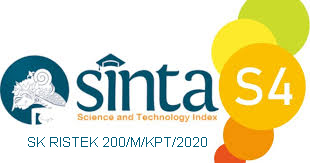Anti-Lock Breaking System Pada Krl Commuter Line Jabodetabek Sebagai Penunjang Keselamatan Mengunakan Fuzzy Inference System
Abstract
The public transportation model which is currently widely used by people who live in Jakarta, Bogor, Depok, Tangerang and Bekasi (JABODETABEK) is the Commuter-Line Electric Train (KRL). According to online media sources(http://Kompas.com 2 December 2015), currently, the JABODETABEK Commuter-Line KRL can carry 900,000 passengers every day. Anti Lock Braking System (ABS) is a braking system that maintains the position of the wheels and the road to prevent tire/wheel slip. Anti Lock Braking System was first used or applied to aircraft. Vehicles that are not equipped with the Anti-lock Braking System must be updated. The driver makes optimal braking to prevent slip between the wheels and the road or rail so that the vehicle stops perfectly. In this paper, we will use fuzzy inference logic to support an Anti-lock Braking System (ABS). Fuzzy inference is a logical method because when determining variables in the fuzzy method, the variable must have an International Standard (SI).
Keywords
Full Text:
PDFReferences
S Syahputra, R., Teknik, J., Fakultas, E., & Yogyakarta, U. M. (2015). Simulasi Pengendalian Temperatur Pada Heat Exchanger Menggunakan Teknik Neuro-Fuzzy Adaptif. Jurnal Teknologi, Teknik Elektro UMY, 8(2), 161–168.
Heldiana, H., Rusdinar, A., & Susanto, E. (2015). Pada Mobil Listrik Dengan Metode Fuzzy Logic Design and Implementation of Brake Control System As Object Distance Adjusters on Electric Car With Fuzzy Logic, 2(2), 2184–2191.
Budiarto, A. try. (n.d.). PROTOTYPE SISTEM PENGEREMAN KENDARAAN DENGAN FUZZY LOGIC DAN SENSOR KECEPATAN BERBASIS MIKROKONTROLER ATMega8535, (4), 1–5.
indra hermawan, suwahyo, suranto margo sulistyo. (2012). Automotive Science and Education Journal, 1(1).
Fatkhurrozi, B., Muslim, M. A., & Santoso, D. R. (2012). Penggunaan Artificial Neuro Fuzzy Inference Sistem (ANFIS) dalam Penentuan Status Aktivitas Gunung Merapi. Jurnal EECCIS, 6(2), 113–118.
Wahjono, E. (2015). Pengaturan Kecepatan Motor Induksi sebagai Penggerak Mobil Listrik dengan kontroler Fuzzy Logic, 1(3), 136–144.
Yazid, E. (2009). Penerapan Kendali Cerdas Pada Sistem Tangki Air Menggunakan. Himpunan Fisika Indonesia, 2009(2), 11–23. Retrieved from Lembaga Ilmu Pengetahuan Indonesia
Rozi, F., & Sukmana, F. (2016). Metode siklis dan adaptive neuro fuzzy inference system untuk peramalan cuaca. Jurnal Ilmiah Penelitian Dan Pembelajaran Informatika (JIPI), 1(1), 7–13.
Novita, N. (2019). Metode Fuzzy Tsukamoto Untuk Menentukan Beasiswa, 1, 51–54.
Simanjuntak, A. M., & Abda, S. (2013). Karakterisasi Komposit Matriks Logam Al-SiC pada Produk Kanvas Rem Kereta Api. Jurnal E-Dinamis, 6(2), 61–69.
Aisjah, A. S., & Widodo, B. S. (2009). Design of Smart Course Control System Based on Fuzzy Logic in the Tracking Ship At Tanjung Perak. Senta 2009, (1), 1–4.
Aryadi, K. N., & , Aris Triwiyatno, and B. S. (2016). Desain Sistem Kontrol Adaptive Neuro Fuzzy Inference System ( Anfis ) Pada Model Automatic-Antilock Braking System Tugas Akhir Semarang Januari 2016.
Surya, A., Triwiyatno, A., & Setiyono, B. (n.d.). Desain Kontroler Genetic-Fuzzy Pada Model Automatic- Antilock Braking System.
Wahyu W, Rakhmat, Afriyanti, L. (2009). Aplikasi Fuzzy Inference System ( Fis ) Metode Tsukamoto Pada Simulasi Traffic Light Menggunakan Java. Program, 2009(Snati), 104–107.
Jang, J. R. (1993). ANFIS : Adap tive-Ne twork-Based Fuzzy Inference System, 23(3). https://doi.org/10.1109/21.256541
Kamar, S. (n.d.). Analisis Pergerakan Kereta Rel Listrik Untuk Disain Sistem Keselamatan Kereta Api Otomatis Analysis of Electric Rail Train Movements for Automatic Train Protection System Design.
Çimen, T. (2008). State-Dependent Riccati Equation ( SDRE ) Control : A Survey, 2011(August), 3761–3775. https://doi.org/10.4236/ica.2011.
Rosalia Dwi Putri Loven , Maylanny Christin, A. I. (2016). Crisis Management Strategy Public Relations of Pt Kai Commuter, 3(2), 2234–2249..
DOI: https://doi.org/10.31326/jisa.v1i2.310
Refbacks
- There are currently no refbacks.
Copyright (c) 2018 Sam Ali Nurdin, Ketut Bayu Yogha Bintoro

This work is licensed under a Creative Commons Attribution-ShareAlike 4.0 International License.
JOURNAL IDENTITY
Journal Name: JISA (Jurnal Informatika dan Sains)
e-ISSN: 2614-8404, p-ISSN: 2776-3234
Publisher: Program Studi Teknik Informatika Universitas Trilogi
Publication Schedule: June and December
Language: English
APC: The Journal Charges Fees for Publishing
Indexing: EBSCO , DOAJ, Google Scholar, Arsip Relawan Jurnal Indonesia, Directory of Research Journals Indexing, Index Copernicus International, PKP Index, Science and Technology Index (SINTA, S4) , Garuda Index
OAI address: http://trilogi.ac.id/journal/ks/index.php/JISA/oai
Contact: jisa@trilogi.ac.id
Sponsored by: DOI – Digital Object Identifier Crossref, Universitas Trilogi
In Collaboration With: Indonesian Artificial Intelligent Ecosystem(IAIE), Relawan Jurnal Indonesia, Jurnal Teknologi dan Sistem Komputer (JTSiskom)
JISA (Jurnal Informatika dan Sains) is Published by Program Studi Teknik Informatika, Universitas Trilogi under Creative Commons Attribution-ShareAlike 4.0 International License.


















